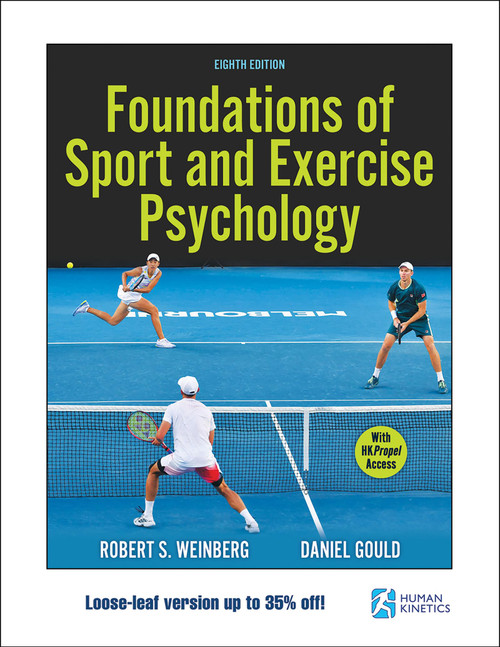The latest edition of the best-selling sport and exercise psychology book on the market, Foundations of Sport and Exercise Psychology, Fifth Edition, provides a thorough introduction to the key concepts in the field. Written by internationally respected authors, it provides students and new practitioners with a comprehensive view of sport and exercise psychology, bridges the gap between research and practice, conveys principles of professional practice, and captures the excitement of the world of sport and exercise.
A supreme effort has been made to meet the increasing needs of professors, practitioners, and students. To further improve the total learning experience, the fifth edition features the following:
A streamlined online study guide that provides an interactive learning experience for students
A new full-color format that visually engages students in the information
An emphasis on the educational journey that students take through the field of sport and exercise psychology, helping them envision where they can be most successful in the field
Thoroughly updated material that reflects the latest research and practice to keep readers aware of recent findings and hot topics in the field
New sidebars with contemporary practical examples, case studies, and anecdotes to help students understand various theories and concepts
Foundations of Sport and Exercise Psychology, Fifth Edition, provides students with a unique learning experience, taking them on a journey through the origins and goals, key concepts, research development, and career options available in the field. The book contains seven parts that may be studied in any sequence. Part I introduces students to the field, detailing its history, current status, and the various roles of sport and exercise psychologists. Part II focuses on personal factors that affect performance and psychological development in sport, physical education, and exercise settings. In part III, the authors focus on two major classes of situational factors that influence behavior: competition and cooperation, and feedback and reinforcement. Part IV focuses on group interaction and processes, while part V discusses how psychological techniques may be used to help people perform more effectively. Part VI addresses the various roles psychological factors play in health and exercise. The final section, part VII, deals with topics of psychological development and well-being that are important to both society and sport and exercise psychology, including childrens psychological development through sport participation, aggression in sport, and moral development and good sporting behavior in sport and physical activity contexts.
The online study guide allows the subject of sport psychology to come alive to its users. The study guide works directly with the text; mentions of the study guide appear throughout each chapter to encourage students to apply knowledge gained from the text. This online study guide features several individual and small-group learning activities that may be completed electronically and saved as an .rtf file. This new format allows instructors to choose whether they would like students to complete the activities for personal use, print and hand them in as assignments, or submit them for assessment as an e-mail attachment or through a learning management system. The study guide activities require students to do the following:
Use actual sport and exercise psychology instruments to assess their skills
Determine how to respond to real-life scenarios (with short answers or essays)
Review and design research studies and experiments
Search the Internet for relevant information
Apply and test their understanding of principles and concepts of sport and exercise psychology
Audio and video clipssome with associated activitiesoffer considerable insight on the issues discussed in the text. The audio clips feature esteemed experts from the field discussing key course concepts that they have studied and refined during their professional careers. Students will hear from experts such as Diane Gill, Rainer Martens, Robin Vealey, and other pioneers in the field. The video clips provide students with a realistic look at how sport psychology consultants interact and communicate with athletes to improve athletic experiences, allowing students to peer into the real world of a practicing sport psychology consultant. Both the audio and video clips help students understand the research and practice of sport psychology in todays society.
Foundations of Sport and Exercise Psychology, Fifth Edition, also supplies in-depth learning aids to help students think more critically about applying the material. These aids include chapter objectives and summaries, informative sidebars, key terms, key points, and discussion questions in each chapter. The enhanced design, artwork, and photos will also help make the material more interesting and accessible to readers.
Updated ancillary materials, including an instructor guide, test package, and presentation package, are available online for instructors.
Foundations of Sport and Exercise Psychology, Fifth Edition, is a powerful learning tool for understanding human behavior in sport and exercise settings. This fifth edition continues to ensure that future researchers and practitioners in the field are well equipped and enthused about the possibilities and challenges they will encounter.












